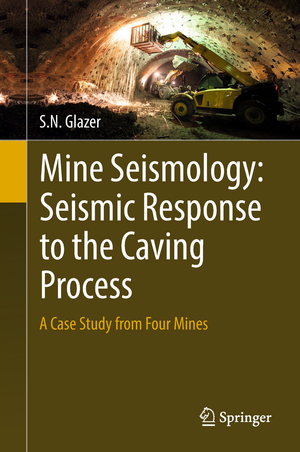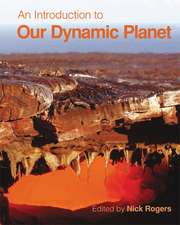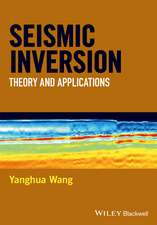Mine Seismology: Seismic Response to the Caving Process: A Case Study from Four Mines
Autor S.N. Glazeren Limba Engleză Hardback – 14 aug 2018
This book presents the results of seismic data analysis and interpretation based on nearly one million seismic events. This seismicity was induced by the caving process in four copper mines, each located on a different continent. The book not only serves as an interpretation guide, it also illustrates the benefits of evaluating data from different mines:
- How to establish which seismic data base is faulty and why
- The formation of a universal seismic response to the caving process
- Indisputable evidence that hydro-fracturing improves underground safety
This book invites discussion on more general aspects of research, such as:
- Basic research, applied research and implementation
- Predicting mine-induced seismic events
- Quantitative versus qualitative seismology
- Research versus pseudo-research
- What is genuine research?
[In the Parlabora Mine] Stefan has demonstrated that [the] use of the seismic system was a very practical means of monitoring the progression of the cave up to and beyond break through into the open pit above. The seismic system was vital in drawing up the undercutting and seismic protocols and determining the maximum potential seismic hazard level. Peter Townsend Retired Mine Manager and Consultant
I consider Stefan the pioneer of using microseismic data to provide understanding of the mechanism and progress of cave mining. Science has advanced considerably since the use of less than reliable extensometers to monitor the cave back position and Stefan was leading this advance. (…)This book provides a lot of useful insight[s] in how we can best understand the data that we (…) gather and how to change this data into useful information. Neil Hepworth C. Eng, MIMMM, Geomin Consultorio – Brazil. Consultant Mining and Geotechnics
Stefan mine seismology trilogy is (…) a comprehensive tutoring on how to analyse and interpret mine induced seismicity. This coaching is based on multiple practical examples (…) presented from the problem to be solved [with] input data tests followed by analysis and interpretation. This last is presented with many details that explain the whole process. Mahdi Bayuargo, ST, MAScPT. Duaem Gada Bayuagus Managing Director
| Toate formatele și edițiile | Preț | Express |
|---|---|---|
| Paperback (3) | 350.88 lei 38-44 zile | |
| Springer International Publishing – 18 aug 2018 | 350.88 lei 38-44 zile | |
| Springer International Publishing – 13 dec 2018 | 355.22 lei 38-44 zile | |
| Springer International Publishing – 27 mai 2018 | 685.46 lei 38-44 zile | |
| Hardback (3) | 378.78 lei 38-44 zile | |
| Springer International Publishing – 18 oct 2017 | 391.99 lei 3-5 săpt. | |
| Springer International Publishing – 10 mai 2016 | 660.49 lei 3-5 săpt. | |
| Springer International Publishing – 14 aug 2018 | 378.78 lei 38-44 zile |
Preț: 378.78 lei
Nou
Puncte Express: 568
Preț estimativ în valută:
72.49€ • 78.71$ • 60.89£
72.49€ • 78.71$ • 60.89£
Carte tipărită la comandă
Livrare economică 19-25 aprilie
Preluare comenzi: 021 569.72.76
Specificații
ISBN-13: 9783319955728
ISBN-10: 3319955721
Pagini: 220
Ilustrații: XIV, 242 p. 213 illus., 196 illus. in color.
Dimensiuni: 155 x 235 mm
Greutate: 0.65 kg
Ediția:1st ed. 2019
Editura: Springer International Publishing
Colecția Springer
Locul publicării:Cham, Switzerland
ISBN-10: 3319955721
Pagini: 220
Ilustrații: XIV, 242 p. 213 illus., 196 illus. in color.
Dimensiuni: 155 x 235 mm
Greutate: 0.65 kg
Ediția:1st ed. 2019
Editura: Springer International Publishing
Colecția Springer
Locul publicării:Cham, Switzerland
Cuprins
1. Introduction.- 2. Seismic data assessment.- 3. Seismic signature of the caving process.- 4. Comparison of seismicity induced while mining hydro-fractured and non-preconditioned rock mass volumes.- 5. Summary and Conclusions.- Index.
Recenzii
Notă biografică
Stefan N. Glazer has over 40 years of experience in the application of geophysical methods in the mineral prospecting and mining industry. He has been an independent mine seismology consultant since 2004, and before that he worked as a mine seismologist for AngloGold and then PMC. He holds an MSc degree in Prospecting Geophysics (1972) and a PhD degree in Mine Geophysics (1997), both from the AGH University of Science and Technology, Krakow, Poland.
He has published a number of technical papers, the last eleven of which were on monitoring the PMC caving process. He was involved in the Mass Mining Technology 2 Project; in this regard he wrote on the “seismic signature of the caving process,” which involved the analysis and interpretation of seismicity recorded at El Teniente, Chile, PT Freeport DOZ Mine, Northparkes Mine Lift 2 and PMC. The aim of this research was to make maximum use of the recorded seismicity to monitor and manage the caving process. In 2007 and 2011 he lectured on the subject of Mining Induced Seismicity for the Master Program in Geomechanics Applied to Mining at the School of Engineering, Universidad de Los Andes, Santiago, Chile. Between 1980 and 2012 Stefan published 19 papers, including 15 on mine seismology.
He has published a number of technical papers, the last eleven of which were on monitoring the PMC caving process. He was involved in the Mass Mining Technology 2 Project; in this regard he wrote on the “seismic signature of the caving process,” which involved the analysis and interpretation of seismicity recorded at El Teniente, Chile, PT Freeport DOZ Mine, Northparkes Mine Lift 2 and PMC. The aim of this research was to make maximum use of the recorded seismicity to monitor and manage the caving process. In 2007 and 2011 he lectured on the subject of Mining Induced Seismicity for the Master Program in Geomechanics Applied to Mining at the School of Engineering, Universidad de Los Andes, Santiago, Chile. Between 1980 and 2012 Stefan published 19 papers, including 15 on mine seismology.
Textul de pe ultima copertă
This book presents the results of seismic data analysis and interpretation based on nearly one million seismic events. This seismicity was induced by the caving process in four copper mines, each located on a different continent. The book not only serves as an interpretation guide, it also illustrates the benefits of evaluating data from different mines:
- How to establish which seismic data base is faulty and why
- The formation of a universal seismic response to the caving process
- Indisputable evidence that hydro-fracturing improves underground safety
This book invites discussion on more general aspects of research, such as:
- Basic research, applied research and implementation
- Predicting mine-induced seismic events
- Quantitative versus qualitative seismology
- Research versus pseudo-research
- What is genuine research?
[In the Parlabora Mine] Stefan has demonstrated that [the] use of the seismic system was a very practical means of monitoring the progression of the cave up to and beyond break through into the open pit above. The seismic system was vital in drawing up the undercutting and seismic protocols and determining the maximum potential seismic hazard level. Peter Townsend Retired Mine Manager and Consultant
I consider Stefan the pioneer of using microseismic data to provide understanding of the mechanism and progress of cave mining. Science has advanced considerably since the use of less than reliable extensometers to monitor the cave back position and Stefan was leading this advance. (…)This book provides a lot of useful insight[s] in how we can best understand the data that we (…) gather and how to change this data into useful information. Neil Hepworth C. Eng, MIMMM, Geomin Consultorio – Brazil. Consultant Mining and Geotechnics
Stefan mine seismology trilogy is (…) a comprehensive tutoring on how to analyse and interpret mine induced seismicity. This coaching is based on multiple practical examples (…) presented from the problem to be solved [with] input data tests followed by analysis and interpretation. This last is presented with many details that explain the whole process. Mahdi Bayuargo, ST, MAScPT. Duaem Gada Bayuagus Managing Director
Caracteristici
Serves as an interpretation guide Presents analysis of large data sets Illustrates seismicity induced by the caving process Deals with qualitative and quantitative mine seismology











